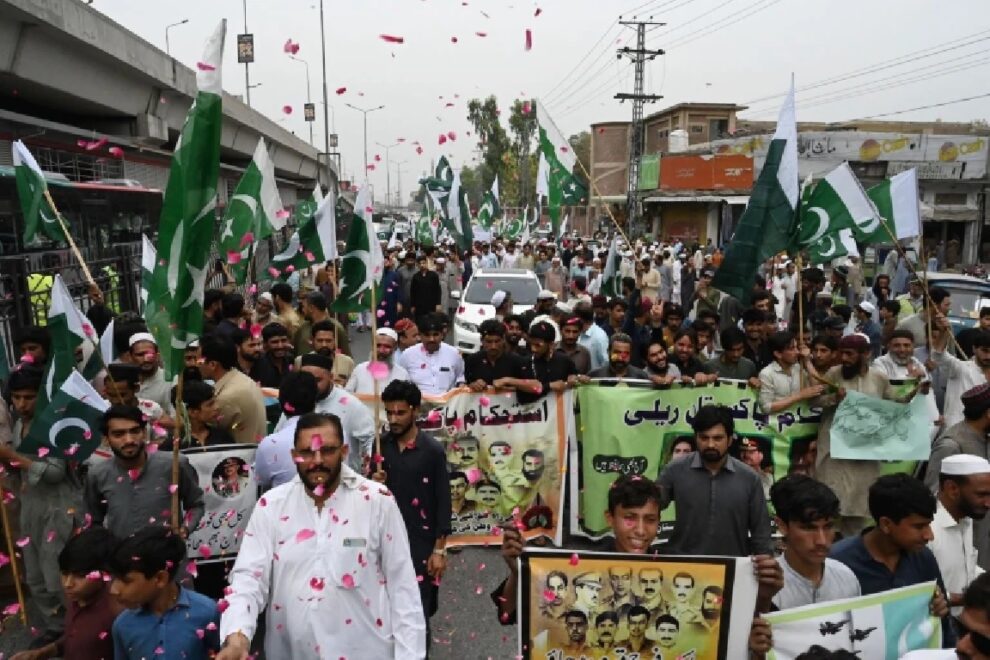Welcome to Foreign Policy’s South Asia Brief.
The highlights this week: The confrontation between former Pakistani Prime Minister Imran Khan and the political establishment escalates, India’s ruling Bharatiya Janata Party loses Karnataka’s state elections, and a major cyclone does damage in Cox’s Bazar, Bangladesh.
What’s Next for Imran Khan?
A week after his arrest on corruption charges, former Pakistani Prime Minister Imran Khan faces an escalating confrontation with the country’s political establishment. Recent developments suggest Pakistan’s military leadership is going full throttle to sideline Khan and his Pakistan Tehreek-e-Insaf (PTI) party from politics. National elections, currently scheduled for October, loom.
Khan blamed Pakistan Army chief Asim Munir for ordering his arrest by paramilitary forces last Tuesday; he was released a few days later. Just before his arrest, Khan repeated allegations that a senior military officer was behind a November assassination attempt against him, which the military denies. Pakistan’s army doesn’t take well to such public allegations.
On Monday, the military released a statement vowing to use the Pakistan Army Act to prosecute the protesters who attacked military facilities after Khan’s arrest, warning that “restraint will no longer be exercised.” (PTI leaders have denounced the violence.) The 1952 law involves the use of military trials, mainly to prosecute military officers. A 2015 amendment gave the military more leeway to prosecute civilians, but it expired in 2019.
This statement, endorsed by civilian leaders, should be read in the context of Pakistan’s recent Supreme Court rulings, which ordered Khan’s release and rejected an earlier government decision to delay two provincial elections. Army leaders seem concerned that the high courts may be too lenient toward Khan—and seek to literally take the law into their own hands.
Even before the military’s statement, Pakistani authorities detained other PTI leaders, purportedly for their role in the violent protests. In conversations with Foreign Policy, PTI supporters in Pakistan also described friends having been arrested in recent days for attending peaceful protests. According to the party, police have even arrested family members of PTI leaders. A few PTI leaders have now announced that they will leave the party, citing the protests against the military—although they could have faced pressure to resign.
Khan remains free on bail for now, but he could be arrested again under any of the numerous charges facing him—which he dismisses as politically motivated. On Wednesday, Khan said police had surrounded his house and that he feared he would be detained again. Islamabad has now accused him of sheltering people involved in the violent protests and threatened to stage a police operation if he does not release them to the authorities within 24 hours.
Although the detentions of PTI leaders and supporters could weaken the party, arresting Khan again and holding him for an extended period could deal it a damaging blow. The PTI revolves around its charismatic and popular leader, and the party may struggle to maintain momentum—and its identity—with him behind bars.
Furthermore, Pakistan’s senior leadership—both civilian and military—seems determined to keep Khan from returning to power; with him detained in the long term, it could redouble efforts to get him disqualified from public office ahead of elections. But with the courts pushing back against Pakistan’s current government and the military’s leverage weakened by public fury, this strategy isn’t guaranteed to succeed.
De-escalation may prove elusive. After reports surfaced that some corps commanders refused to carry out Munir’s orders, PTI supporters hoped the army might ease its crackdown. But the military denied those reports and issued its warning of no restraint. There is already bad blood between Munir and Khan; the Army chief was fired from his then-position as spy chief when Khan was prime minister, reportedly after Munir produced evidence of corruption linked to Khan’s wife.
Before Khan’s arrest, government and opposition leaders met to try to ease tensions. But recent events have seemingly taken talks off the table—because the mood isn’t conducive for talks but also because many potential opposition negotiators are in jail. As for prospects for external mediation, the United Arab Emirates, one of Pakistan’s key partners, reportedly offered its services and was rebuffed by Munir.
The trajectory of the crisis now appears to hinge on national elections, which will stoke tensions whether they happen according to schedule or not. If the vote goes ahead in October, the losers will likely reject the results. But postponing elections would violate the constitution and defy the will of the public.
The October elections could signal a victory for constitutionalism and thus offer Pakistan’s best shot at an off-ramp—even if they only bring short-term relief from the political crisis.
What We’re Following
BJP loses in Karnataka. The Indian National Congress—the country’s main opposition party—scored a big win in the southern state of Karnataka during elections last week, dealing a blow to the Bharatiya Janata Party (BJP). The BJP, which leads the national government, had controlled Karnataka; Congress won 135 of 224 seats in the state legislature, its biggest electoral triumph in Karnataka since 1989. The BJP lost 38 seats—finishing in a distant second with 66 seats—while Congress gained 55.
It’s worth noting that the BJP has never held power in a southern state other than Karnataka—which also has a history of dumping incumbents. Indian Prime Minister Narendra Modi joined the campaign during its last few weeks, banking on his popularity to maintain BJP control of the state. This marks a rare case in which a referendum on Modi’s popularity didn’t go the prime minister’s way.
The BJP’s Hindu nationalism may have played a role in the loss: Congress campaigned on themes of inclusion and tolerance—a tactic that didn’t help it in other state elections last year. Congress leaders also attribute their win to an emphasis on bread-and-butter issues such as inflation and unemployment.
The victory is a personal triumph for de facto party leader Rahul Gandhi, who has sought to reenergize Congress by staging a solitary march across the country calling for unity. The question now is if the party can sustain its momentum, with six more state elections this year and national polls looming in 2024. The BJP remains buoyed by Modi’s popularity, including in populous Uttar Pradesh, a top electoral prize.
Ultimately, Congress has struggled to counter Modi’s charisma and the ruling party’s Hindu-nationalist ideology. And Gandhi himself may not be eligible to contest national elections, unless the courts overturn a conviction on defamation charges from earlier this year—which Congress dismisses as politically motivated.
Major cyclone hits Bangladesh. One of the most destructive cyclones in recent decades made landfall in Bangladesh on Sunday. As the storm approached, the biggest concern was the plight of the more than 1 million Rohingya refugees living in camps in Cox’s Bazar, projected to be in the eye of the storm. Officials relocated hundreds of thousands of people to safer areas, and the camp avoided a direct hit. The brunt of the storm damage instead fell on neighboring Myanmar.
Nonetheless, a statement from Catholic Relief Services warned that while Bangladesh’s refugee settlements were not hit as hard as expected, there is still large-scale damage. According to initial reports, 12,000 houses were destroyed in Cox’s Bazaar and nearby St. Martin’s Island, a local tourist attraction. The island was also dealing with food, water, and power shortages several days after the storm.
Under the Radar
This week, India faces an awkward diplomatic challenge. The Afghan ambassador to New Delhi, Farid Mamundzay (who took up his post under the previous government), has rejected the Taliban’s claim that they have replaced him at the embassy. According to Mamundzay, one of his colleagues “defected” to the Taliban regime while the ambassador was traveling outside India. The Taliban have appointed that staffer as his replacement.
Although no country has recognized the Taliban regime, some of its representatives now staff Afghan embassies in the country’s broader neighborhood. But in these other cases, the sitting embassy leadership hasn’t offered resistance.
India hasn’t commented on the issue, and it will need to be cautious: It had close ties with the government of former Afghan President Ashraf Ghani, but its relationship with the Taliban regime is surprisingly cordial. Last year, New Delhi reopened its embassy in Kabul. India is keen to maintain influence in Afghanistan and pursue its own interests with a presence on the ground.
As a result, New Delhi may opt for strategic silence, hoping that the issue will blow over—and perhaps that the Taliban will give up their claim to the embassy. But that will become harder if the Taliban ask India to intervene. If so, New Delhi would likely back Mamundzay; its nonrecognition of the Taliban means that it’s under no obligation to address the regime’s diplomatic concerns.
Regional Voices
A Dawn editorial welcomes the completion of Pakistan’s latest census, which finds the country’s population has grown to 246 million people, but it laments how some political parties have criticized the results. “Perhaps the best solution … is to accept the numbers as they stand, and work to improve the process so that there are minimal complaints about the eighth census a decade down the line,” it argues.
Analyst Nur-Mohammad Sheikh argues in the Dhaka Tribune that Bangladesh’s government should continue to pursue efforts to repatriate Rohingya refugees. “Since the Rohingya are citizens of Myanmar, their dignified return to their country with guarantees of protection from the Myanmar government can be the only long-term solution to this crisis,” he writes.
In the Print, dermatologist Deepali Bhardwaj discusses the increasing popularity of South Korean skincare treatments in India. “The Korean Wave has taken India by storm and its influence on the cosmetic industry is no exception,” she writes.
Source : FP















